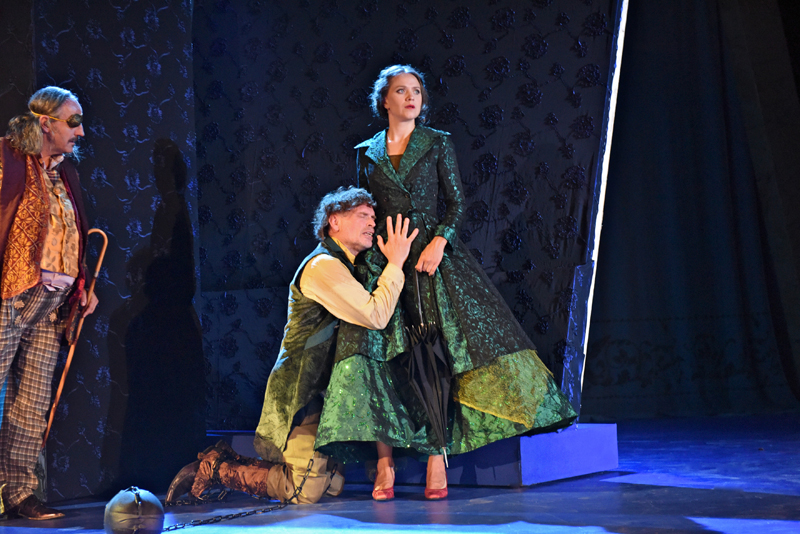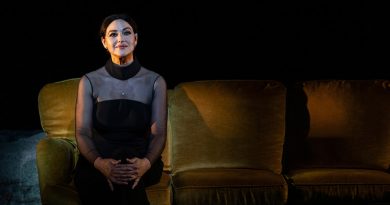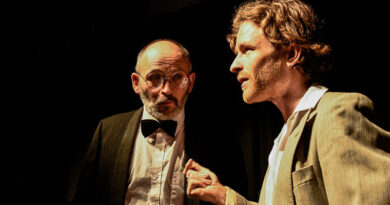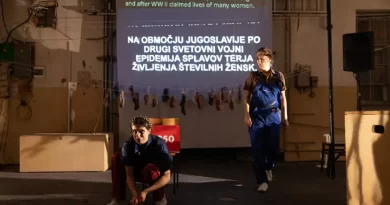Raimundspiele Gutenstein Festival
Ludovico Lucchesi Palli in Austria
1 June 2019
Since 1993, the annual summer Raimundspiele Gutenstein festival has been dedicated to putting on the works of the renowned nineteenth-century Austrian actor-playwright Ferdinand Raimund; he lived in Gutenstein, approximately 70 kilometers southwest of Vienna, and is buried there. When Burgtheater actress Andrea Eckert took over as artistic director in 2015, she initially continued with the tradition of showcasing Raimund’s plays, but for this year’s edition of the festival [2019] she decided to do things slightly differently. She commissioned the Austrian playwright Felix Mitterer whose Passion Play staged in Erl is reviewed on this website) to write a play about Ferdinand Raimund. The result is a tragi-comedy that traces the playwright’s somewhat sad life and is entitled Bruderlein fein (Little Brother Fine), the title of Raimund’s most popular song which featured in his play The Farmer as a Millionaire.
Alongside Johann Nestroy, Ferdinand Raimund is known as one of the key figures of the Alte-Wiener Volkstheater, a movement of “plays for the people”. His famous plays, which often include fairy-tale elements, are the Der Bauer als Millionär, (The Farmer as a Millionaire, 1826), Der Alpenkönig und der Menschenfeind (The King of the Alps, 1828), and Der Verschwender (The Spendthrift, 1834). Many of these are still performed on main Viennese stages, including the bastion of Austrian culture the Burgtheater, and the Theater in der Josefstadt.

Johannes Krisch, Larissa Fuchs, Reinhold G. Moritz in Brüderlein fein.
Photo credit: Joachim Kern.
Bruderlein Fein traces Raimund’s life from his early days as a trainee for a pastry baker and then selling baked goods at theatres to his affair with Antonine Wagner and failed marriage to Luise Gleich, and then on to his first successes as an actor and playwright. This cleverly written play chronicles Raimund’s life in a comic and moving way and permits audience unfamiliar with his writings to easily follow the story.
Burgtheater ensemble actor Johannes Krisch plays the leading role of Raimund. He portrays him as a romantic dreaming of a career in theatre but also as someone aggressive and easily hurt, with insecurities that lead to his tragic suicide. Krisch harmonizes beautifully with Anna Rieser who portrays the stock role of Raimund’s beloved Antonine Wagner, the daughter of the owners of a Viennese coffee shop, with simplicity and distinct femininity. The role of Josef Gleich, who introduces Raimund to the Theater in der Josefstadt as an actor and forces him to marry his daughter Luise Gleich, is played aplomb by Reinhold G. Moritz. Luise Gleich is played by Larissa Fuchs who manages her inherent arrogance and the Viennese accent well, while sometimes going over the top. One scene stands out, however — that where she visits Raimund, by then an already celebrated playwright and actor, asking him to put in a good word for her at the Theater in der Leopoldstadt. He refuses to do so, reminding her that she betrayed and trapped him by pretending he was the father of her child even though it was common knowledge that Prince Alois Wenzel von Kaunitz-Rietberg was the father. Eduard Wildner played the Prince with charisma and insight.
The production featured music by Tommy Hojsa, also the musical director. He was often on stage playing the harmonica and accompanying Krisch singing couplets. Bruderlein Fein was directed by Nicole Claudia Weber, who is mostly known in association with musicals and opera. The performance took place in a tent; the sets by Vanessa Achilles-Broutin consisted mostly of objects that represent walls or windows; they are turned according to the scenic needs, allowing a smooth transition between scenes. She also designed the costumes, which succeed in being evocative of the era.
This interesting production reveals the less joyful side to Ferdinand Rairnund, showing how difficult his life was. The actors always spoke in Viennese dialect, which lent authenticity to the scenes while also keeping up the tradition of the Alt-Wiener Volkstheater. Let’s hope that this deserving play is staged again in the future.

Eduard Wilder, Johannes Krisch and Larissa Fuchs in Brüderlein fein.
Photo credit: Joachim-Kern.









